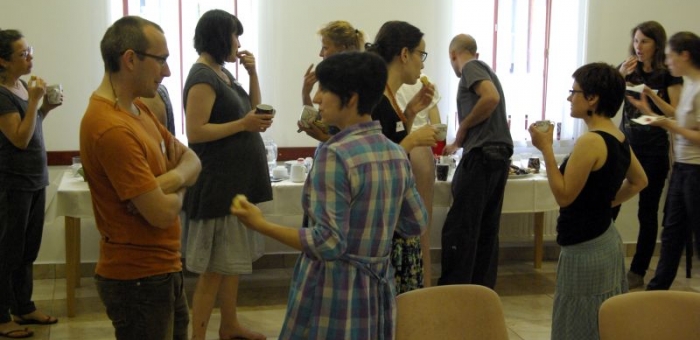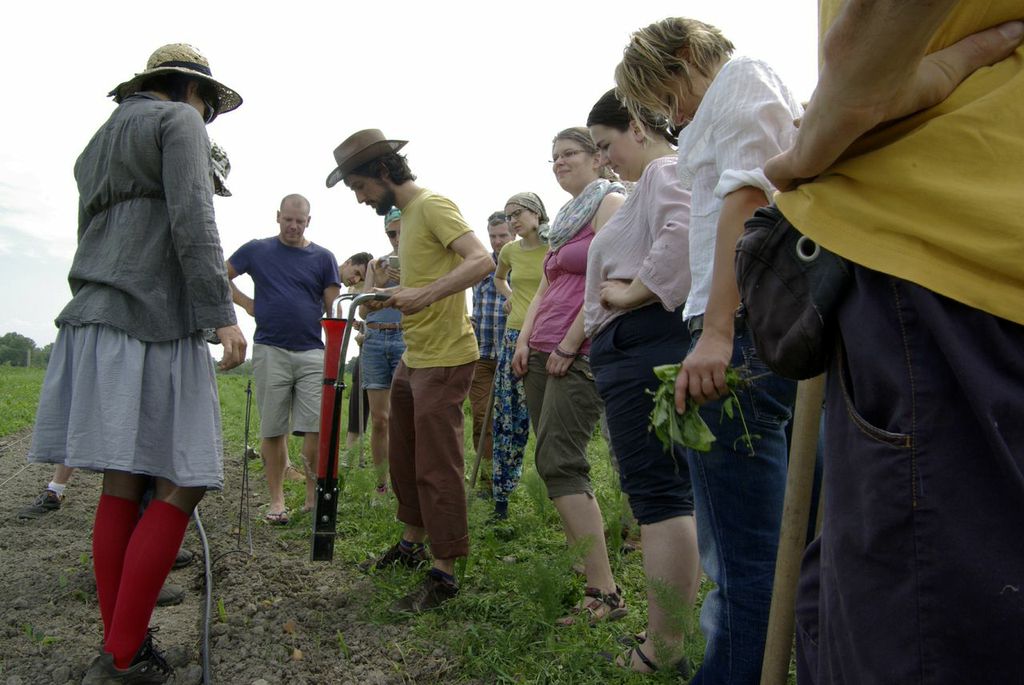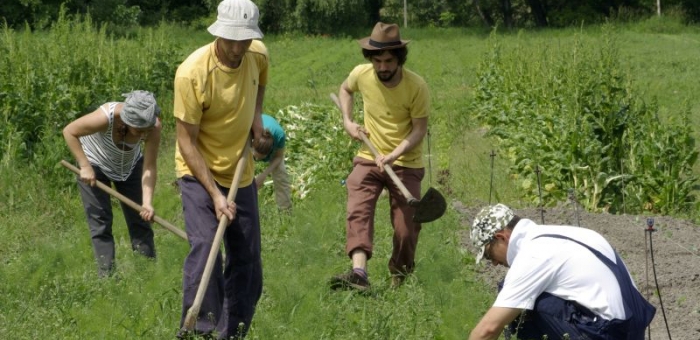By: Zsofia Perényi
 The first visit of the LetSFS Grundtvig Learning Partnerships project was organised in Hungary by TVE. The programme focused on the management of community based food initiatives – including everyday management and also community building related topics. All together 19 participants came to the Hungarian workshop from the partner countries, including experienced farmers and organisers, and also adult learners who got familiar with the topic just recently. The place of the meeting was Vác which was easily accessible from Budapest and was also close to the place of the farm visits.
The first visit of the LetSFS Grundtvig Learning Partnerships project was organised in Hungary by TVE. The programme focused on the management of community based food initiatives – including everyday management and also community building related topics. All together 19 participants came to the Hungarian workshop from the partner countries, including experienced farmers and organisers, and also adult learners who got familiar with the topic just recently. The place of the meeting was Vác which was easily accessible from Budapest and was also close to the place of the farm visits.
The majority of the participants arrived to Budapest on 22th May, so the group travelled together to Vác. The first evening was dedicated for getting to know each other whilst enjoying dinner in the town.
On Friday a training was organised about the management of community based food initiatives. In order to make the cooperation easier among the participants, the morning started with an ice-breaking game. Then the programme continued with an introduction round. All of the delegations explained shortly the situation of solidarity based food systems in their countries and also presented the initiatives what they represent. The photos, presentations and booklets which were brought by the participants made the introduction round more interactive and colourful.
 The next phase of the day included two presentations and discussions about successful social enterprises which could be good examples about everyday management issues. The first example was “Green shop” (www.zoldbolt.hu) which sells sustainable products for consumers. The enterprise operates two shops and also an online webshop, whilst they are also active in community building – for example organising workshops and events about sustainable consumption related issues or communicates on social media surfaces about the issue. The second presentation was about an online ordering system, called “Produced for you” (nekedterem.hu) which delivers vegetables, fruits and possessed food for consumers. The idea of the small enterprise is strongly connected to the forms of community supported agriculture, because in both cases the products are delivered in boxes. The difference in this system is that organisers of the enterprise order the products from several small scale farmers and deliver it to houses based on the orders of customers. The operation of the system requires well planned organisation, because the deliveries are scheduled for two days of the week – so more employees work on the distribution and another company is responsible on the deliveries.
The next phase of the day included two presentations and discussions about successful social enterprises which could be good examples about everyday management issues. The first example was “Green shop” (www.zoldbolt.hu) which sells sustainable products for consumers. The enterprise operates two shops and also an online webshop, whilst they are also active in community building – for example organising workshops and events about sustainable consumption related issues or communicates on social media surfaces about the issue. The second presentation was about an online ordering system, called “Produced for you” (nekedterem.hu) which delivers vegetables, fruits and possessed food for consumers. The idea of the small enterprise is strongly connected to the forms of community supported agriculture, because in both cases the products are delivered in boxes. The difference in this system is that organisers of the enterprise order the products from several small scale farmers and deliver it to houses based on the orders of customers. The operation of the system requires well planned organisation, because the deliveries are scheduled for two days of the week – so more employees work on the distribution and another company is responsible on the deliveries.
We continued the afternoon with some methods which can be useful at the management of CSA communities. We used the “Learning for Change” training methodology and practiced in small groups the mentoring and giving feedback sessions. (http://globalactionplan.com/l4c)
We spent our dinner at Szatyor Shop, in Budapest where we could taste locally purchased seasonal products. Szatyor is a community based social enterprise which has the dual purpose of serving as a civil service organization focusing on the growth of conscious consumption and sustainable development, and a commercial business enterprise for the growers and the association itself. They started with a vegetable box scheme, but nowadays they also operate a coffee and a shop in the heart of Budapest. (szatyorbolt.hu/index.php?route=common/home)
The next day was dedicated for farm visits: we got to know two Hungarian CSA farms which were inspired by French AMAPs. The first visit took place at Biokert in Szigetmonostor (Organic garden, Szigetmonostor) where Áron Pető and Renáta Bangha were our hosts. Áron started organic farming in 2006 and based on the inspiration of an „AMAP visit” in Hungary, he started his CSA in 2010. His farm is about 5 hectares and he produces about 70 families. We started the day with a short weeding which went surprisingly well and fast, probably because there were more than 20 people in the group. Then we visited the farm with the guidance of Áron who explained us the crop rotation and also some of his special techniques. We closed our visit with a nice lunch and an interesting talk about the organisation of his CSA. (www.biokert.info)
During the afternoon we visited Háromkaptár Biokert in Tahitótfalu. The farm is managed by a family and their friends who started organic farming 10 years ago and since 2010 they sell their products for a CSA community (about 50 families). They started farming on 1 hectare, but from this year they produce also on a rented area. Daniella and her family expected us really kindly, we prepared pizza in their oven. After the picnic we started the farm visit which was unfortunately interrupted by a serious hail. Because of the mud and water we could not visit the fields after that, but we had some really interesting talks about their CSA while we were peeling peas together. (http://haromkaptar.hu/)
On Sunday we closed our event with an evaluation round. It seem that everybody was enthusiastic about the international experience sharing and were willing to share more information, photos and materials with the members of the group. It turned out also that the knowledge of the participants about CSA was not equal, so it is really useful to start all of the experience sharing events with a short theoretical introduction about the topic.
Links:
Images by Sara Meissner at Dropbox


